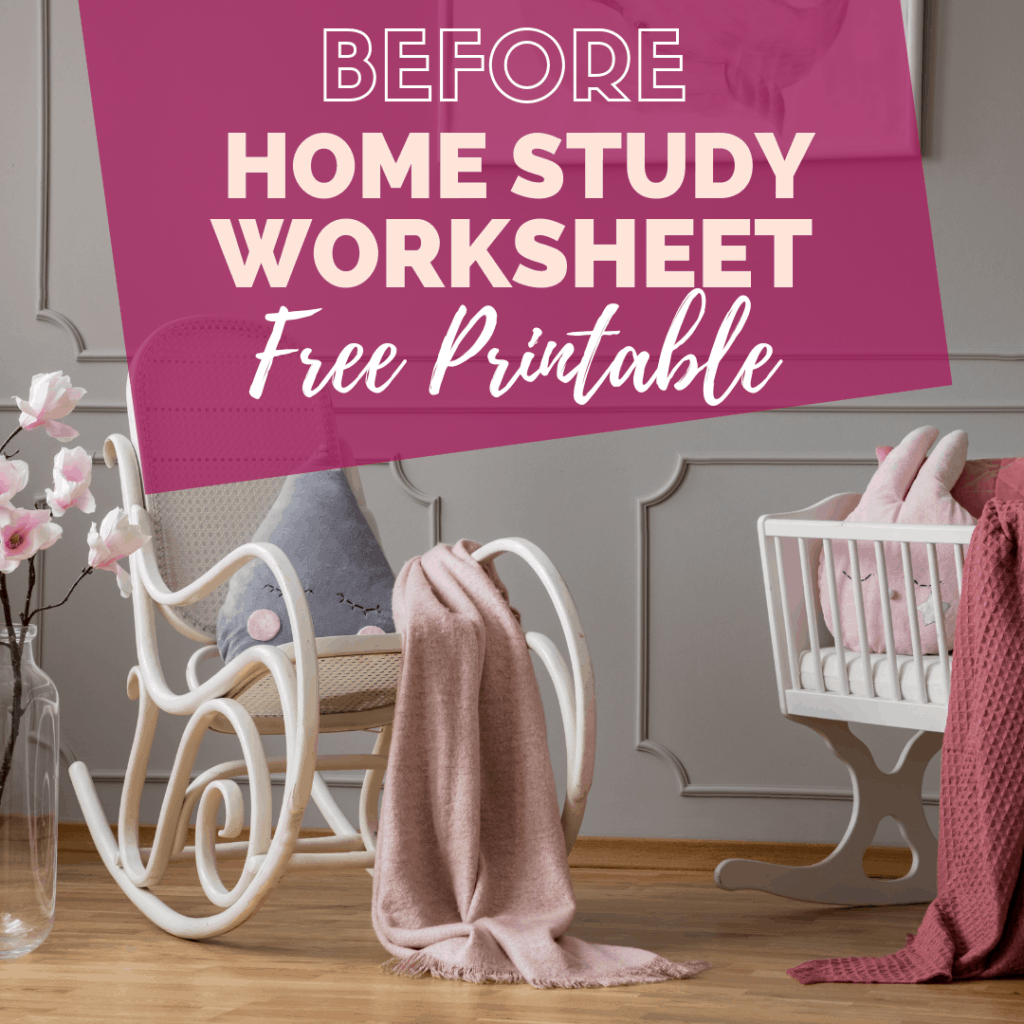Things to Consider Before the Foster Care Home Study
Beginning the foster care home study process is a big step. Use the free printable worksheet to consider these things before the foster care home study.

*This post contains affiliate links. See full disclosure policy above.
Free Printable Pre-Home Study Worksheet Below
When a person or couple first decides to become foster parents, there is a lot of excitement. Many times, couples make the decision to open their home to foster children because they have decided to start a family, or grow the family they already have.
This is an emotionally charged time. However, emotionally, it does not compare to the moment when the first placement call comes in. Before that call, and even before beginning the home study process is the best time to make some decisions about some things that will heavily impact the foster care journey and the family opening their home.
Things to Consider Before the Foster Care Home Study
What is your ultimate goal in becoming a foster parent?
Before you begin the foster care home study process, and certainly before you accept your first foster placement, it is important to know what your ultimate goal is in opening your home to foster children. Some options might be:
- Emergency foster placement for children until a foster home can be located
- Providing respite care for foster families
- Providing temporary or long term foster care for children in need
- Fostering with the goal of adoption
Do you want to adopt?
Decide if you will consider adoption and under what circumstances you might consider it.
Some children require a “pre-adoptive” placement, and with many children the possibility of adoption is unlikely. The goal of foster care is always reunification first.
Families who want to adopt will sometimes pursue options of adopting internationally or even domestically without an agency.

Consider Numbers
How many children will you foster at one time? This question is partially determined the amount of space in your home. Specifically, what kind of foster care bedroom space you can offer.
There are also limits on how many children you can foster at one time and how many children you are allowed to have in your home total, including your other biological and adopted children.
Beyond those requirements, consider how many children you believe you will be able to effectively foster at one time.
- Will you be suddenly out numbered as parents?
- Will your other children suddenly be out numbered?
- Do you have sufficient space in your vehicle?
- Will you consider a sibling group?
Consider Ages
What age children will you open your home to? This is huge! An infant’s needs are drastically different from those of a teenager.
Infant Needs
- Round the clock care
- may not sleep through the night
- Diapering
- Feeding
- Additional medical visits
Toddler Needs
- Toileting help
- Extensive care (toddlers are often described as “being in to everything”)
- Developmental training
- Health care visits
- Engagment from parents
Teen Needs
- Responsibilities, i.e. jobs, community service
- Transportation
- Extracurricular Activities
- Homework Help
- Social Needs, i.e. dating
- Phones, Screens, Cars
- Space
Questions to Ask
- What age children do you have experience with?
- What are the ages of your own children?
- How might a child this age impact my home and my marriage?
- Will a child this age have privileges my other children do not have due to age?
Consider Gender
You bedroom space may impact the gender of the child you are able to foster. If you only have a two bedroom home and already have a female child, you could only foster girls, unless you foster an infant boy and your state allows children under two year to share a room with parents.
Questions to Ask
- Do you have experience with boys, girls or both?
- Do you have the bedroom space for either girls, boys or both?
- How do your children feel about the gender of the child or children you open your home to?
- Will you consider fostering a trans gendered or homosexual children? **most states do not currently have guidelines to address these issues. Please talk openly with your agency and home study social worker.
Consider Medical Needs
Some children in foster care, especially infants have intense medical needs, like our youngest daughter.
Children can be considered medically needy, medically complex or medically fragile or a number of reasons including genetic issues, birth defects, and substance exposure.
Children with additional medical needs, no matter the age, require additional time and care. Sometimes they require specialized care in the home. Most agencies provide additional training for families willing to provide a foster home for a medically fragile child.
Children who are considered medically fragile also often require in home equipment and supplies. Storage space for medical supplies is an issue we didn’t think about until we were stashing boxes all over our house.
Questions to Ask
- How many specialists does the child see?
- What medical equipment is required, i.e. feeding pump, suction machine, mobility equipment?
- Is the child able to ambulate age appropriately?
- What is the child’s developmental age?
- What are the existing diagnoses?
- Does the child receive any therapies in the home or outside the home i.e., Occupational, Physical, speech, feeding?
Emotional and Behavioral Issues
Some children in the foster care system have intense emotional issues due to trauma from abuse or neglect. Those issues manifest in many different ways.
Children in foster care may have behavioral issues ranging from violent tantrums to sensory self-stimulation in times of either stress or excitement. Research shows that older children may have a difficult time understanding emotions in others, which can lead to misunderstandings and learned behaviors which are not very helpful in social exchanges.
Foster parent training should address many of these issues, how they manifest, and how they should be handled in a therapeutic foster home.
Some common diagnoses to be familiar with are:
- Reactive Attachment Disorder
- Post Traumatic Stress Disorder
- Anxiety
- Depression
Sexual Abuse
Most children and youth who have been abused do not go on to abuse others, and many live happy, healthy, successful lives. However, it is important to consider, before a placement call, if you will consider fostering a child who has been sexually abused or a child who has acted out sexually.
Important to Note
Many children who have never been in the foster care system, have never been abused or neglected and have no prenatal alcohol and drug exposure have one or more of the diagnoses listed above. Also, there are foster children who carry none of these diagnoses.
Family of a Foster Child
As a foster parent, you will not only be interacting with your foster child, but the foster child’s parents and extended family. Most of the time, foster children still have parents or other family involved in their lives. You may be thinking, “This is obvious.” However, it never really hits home until it is a reality for you.
The God Factor
Of course, I would follow up all of these questions with the caveat that if God is calling you to foster a child, no matter the age, gender, ethnicity, or type of issues, then do it. We had no idea what we were capable of as a family until our youngest daughter came into our lives.
She was medically fragile, and completely intimidating. Now, I cannot imagine our life without her.
Pre Home Study Worksheet
It is best to consider all of these things before you even begin the foster care home study process. Though your thoughts and feelings may change as you go through the foster care training, at least you will have a beginning reference point.
It is also important to know where each parent stands on some of the larger issues before you even begin the fostering process.
Use the worksheet below to write down your thoughts now. Consider printing one for each parent and competing them seperately. Then bring them togthether to compare and discuss your feelings and answers. Getting this information on paper provides a perfect launch pad for discussion. You may even consider printing a worksheet for your children if they are old enough to take part in the discussion.


